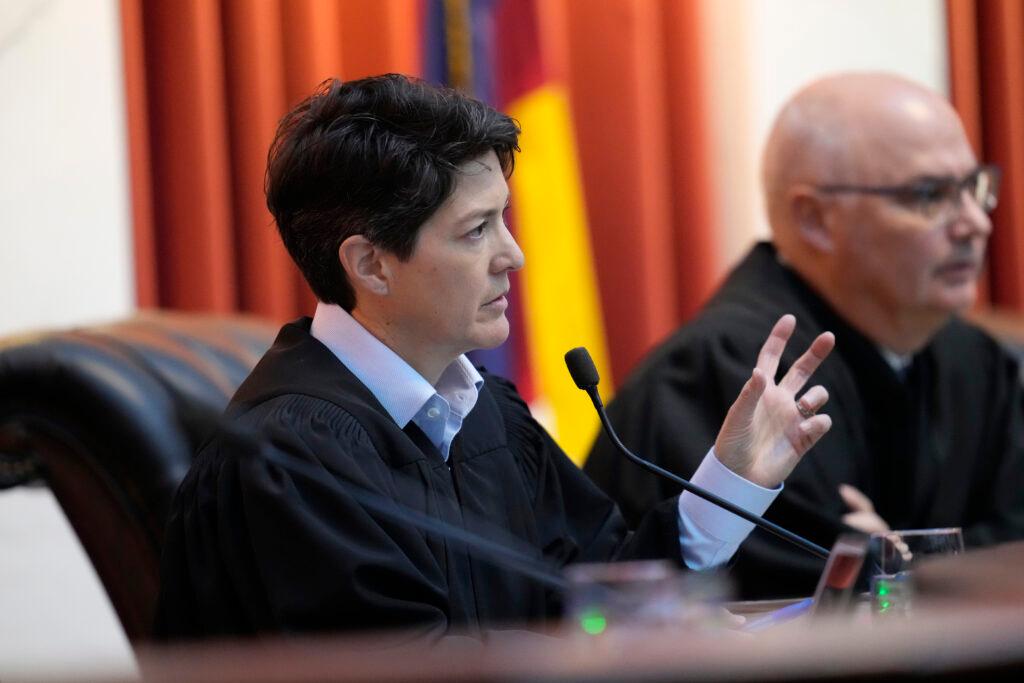
Monica Márquez’s name is synonymous with firsts.
In 2010, she broke barriers when former Gov. Bill Ritter appointed her as the first Latina to serve on the Colorado Supreme Court. In July 2024, she added another milestone to her trailblazing career; being sworn in as the court’s chief justice, making her the first Latina to hold the state's top judicial position.
"I've never claimed to be the first openly gay justice or chief," Márquez said in a recent interview with Colorado Matters host Chandra Thomas Whitfield at the Ralph L. Carr Colorado Judicial Center in downtown Denver. "I am openly gay and I'm definitely the first Latina in both positions. It's also the first combination of both identities in the role."
Now the longest-serving openly LGBTQ state Supreme Court justice in the country, Márquez’s path to the Colorado Supreme Court was marked by a career spanning roles in both public service and private practice. Her leadership and legal acumen have been celebrated with numerous awards, including the 2014 Trailblazer Award from the Latin First Foundation and the 2023 Wiley Daniel Lifetime Achievement Award, named after Colorado’s first Black federal judge, from the Center for Legal Inclusiveness.
Born and raised in Grand Junction, Márquez, a Stanford University and Yale Law graduate, said she carries many of the values she garnered while growing up on Colorado’s Western Slope into her work issuing opinions on some of the state’s most contentious legal issues.
The spirit of groundbreaking endeavors seems to run in her family. Her father, Jose D.L. Márquez was the first Latino judge on the Colorado Court of Appeals and his career had a profound impact on her path.
"I was in eighth grade when he became the first Latino district court judge in Mesa County; it wasn’t easy being the judge's kid," she recalled. "But looking back, it was an amazing move for him and our family."
Márquez worked as a teacher, as her mother Cherry had, before pursuing a career in law. She said she works hard to remain grounded. Taking on the high-profile position on the state’s highest court has meant giving up a bit of the anonymity she long enjoyed as an introvert, including often being recognized by law students or members of the legal community while running errands.
"I've been stopped at King Soopers just trying to buy bananas," she said with a laugh. "People are surprised when they find out I'm a Supreme Court justice because (they say) I don’t fit the image they have in mind."


Her humility and relatability, combined with experience that includes roles as deputy attorney general, assistant solicitor general and assistant attorney general, have made Márquez a beloved figure in Colorado’s legal community. She has earned the respect of colleagues not only for her judicial work but also for her leadership during times of transition in the judiciary. In 2020, the Colorado Supreme Court instituted a rotating system for the chief justice position, allowing Márquez plenty of time to prepare before taking over the role from her predecessor, Justice Brian Boatwright.
"I feel more prepared than any chief justice has in a long time," she said. "I’ve had the opportunity to meet with key leaders across the state and really learn the intricacies of the role."
Just weeks into her new position, Márquez said her focus is on strengthening the state’s judicial system and continuing to build a more inclusive legal community, which means juggling a full docket as a justice and duties overseeing more than 4,000 employees in Colorado.
“The volume of email that comes in all day, every day from all over the state is staggering,” she said.
During her tenure, Marquez aims to advance a workplace culture initiative that she began in 2022, which focuses on improving the well-being of judges and court staff.
“We’re revamping our code of judicial conduct and personnel rules,” she said, noting the importance of creating a supportive environment within the judiciary.
The initiative seems particularly relevant given the recent judicial misconduct scandal that rocked the state judiciary, including Colorado’s Supreme Court, in 2021. Following two independent investigations that revealed troubling issues within the court's culture, Márquez said she and her colleagues took swift action.
“We organized a listening tour, where all seven justices met directly with employees across the state,” she recalled. The insights gained from these discussions guided their efforts to create substantial changes within the system.
Márquez, who is on the November ballot for voters to decide whether she may retain her position, also emphasized the need to adapt to evolving challenges in the judicial landscape, exacerbated by the pandemic. The increased use of virtual court proceedings has led to greater access to justice but also new complications, including incidents of courtroom disruptions.
“We’re looking to the legislature for additional judges to help ease the workload burden across the state,” she said.


As she navigates these complexities, Márquez says she remains committed to maintaining a robust judicial environment in Colorado.
“The job of being a judge has changed a lot since 2019,” she said. “The world has become slightly meaner and our jobs are tougher.”
She declined to comment about ethical concerns some have raised recently regarding justices now serving on the U.S. Supreme Court, but Márquez expressed strong views on judicial ethics in the state, emphasizing that Colorado's Code of Conduct for judges is more stringent than federal standards.
“I’m proud of our system,” she said. “We have a judicial discipline process and a performance evaluation process that serve as a gold standard for these types of systems.”
Throughout her tenure as a justice, she has been very clear in stating that as a judge, she considers her role to be neutral, fair and impartial.
“I do not represent any constituency; like all of my colleagues, I bring my professional and life experience to the table,” she has said. But she is also adamant that the historic significance of her recent appointment and many of her previous roles is not lost on her.
"I never imagined I’d be here," Márquez said. "But I’m incredibly grateful for the journey and I’m ready for what’s next.”



